Translating novels, short stories, and poetry into English in a way that remains true to their original form can take years, even decades of dedication. And then there is the job of persuading the Anglophone publishing world to take chances. Translators’ labor is ultimately rewarding for readers who are able to embark on these previously-unknown literary journeys.
The second part of our list of contemporary translators features award-winning translators who are also novelists and poets, who work from Korean, Telugu, Tamil, Portuguese, and Bulgarian to English, and one who renders contemporary American literature into Japanese. I spoke to them about the anti-imperialism of translation acts, the numerical abundance (also the economic precarity) of BIPOC translators, and the joys and challenges of translating swearing and grammar that doesn’t exist in English.
Don Mee Choi: Korean to English

Seoul-born Korean American poet Don Mee Choi includes translations of South Korean poet Kim Hyesoon, and her recent book, Autobiography of a Death. Choi’s radiant and supremely-thoughtful (references include Walter Benjamin, Ingmar Bergman, Korean shamanism, and her own personal history) in her treatise, Translation Is a Mode=Translation Is an Anti-Neocolonial Mode, certainly will have you considering language, translation, and life in general, from a different perspective. Choi’s own collection of poetry DMZ Colony landed on the 2020 National Book Award Longlist for Poetry.
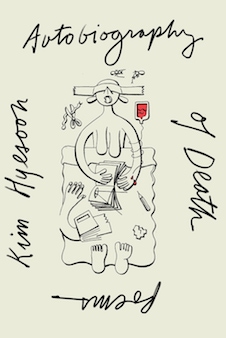
On non-poets being translators of poetry: “Reading translation is an extension of translation. It’s an opportunity for poets and non-poets to practice curiosity and dislodge themselves from whatever cultural greatness they were taught to believe in. So reading translation is about not making things great again. It’s an anti-nationalist, anti-imperialist act. Therefore, I think translation is always possible.”
Translating a chain letter: “I pretended to write in English when I was a little child because I thought that my father was a foreigner. There is a poem about this in my collection, Hardly War. I was convinced that my father had to be a foreigner because I never saw him more than a few times a year. As a war photojournalist, he was in Vietnam and other war zones. I wanted to know the language he spoke outside of South Korea. After we moved to Hong Kong, I couldn’t play piano anymore, so I played with my father’s typewriter instead. One day, I received a chain letter in English—this was popular way back when—and I typed all 91 letters. When my mom asked me what I was typing, I translated the letter to her, overly exaggerating that something terrible might happen to my father if I didn’t type all the letters. My father is almost 91 this year. I can’t take credit for it, but I can’t help wondering.”
Madhu H. Kaza: Telugu to English

Born in Andhra Pradesh, India, New York City-based Madhu H. Kaza’s translated works include stories by the feminist writers Volga and Vimala Devi. She edited Aster(ix) Journal’s Kitchen Table Translation, a wondrous investigation of the pathways of translation and migration. The volume features John Keene, Teju Cole, Don Mee Choi, and many others. In her terrific introductory essay, Kaza writes: “For me, with all its predicaments, all the violence it may carry on its back, translation is an act of hospitality. Hospitality, conceived not as charity, not as condescension or even merely tolerance. A hospitality that recognizes both the dignity and the difference of the other.”
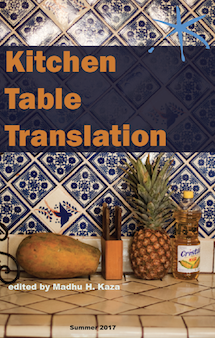
An early act of translation: “There’s a big difference in my relation to the words mamidikaya and mango, which are equivalent. When I arrived in the U.S. as a child I kept asking my mom for mamidikaya and finally in exasperation—because these fruit were not available anywhere in Michigan at the time—she presented me with a round, red, mealy item and said, “Here, this is an apple-mango.” I can’t tell you how furiously I hated apples into my adulthood. The word ‘mango’ was also ruined for me.”
On the challenges that face BIPOC translators: “It took me more than 20 years from my first attempt to learn to read Telugu to the time when I began translating Telugu fiction. One reason it took so long is that I never had access to any institutional support for this work, and working on Telugu was never my primary occupation. I take translation seriously, but it’s still very much a small side project for me. Of course, we need much more support for emerging BIPOC translators and translators working in under-represented languages, but I’m wary of most diversity efforts, well-intentioned as they are. We need people to get together and think deeply about this, and not get self-congratulatory about adding one new diversity mentorship to their ongoing programs. We need to think about how mentorships can be more dynamic and less isolating for the mentees. I was talking with the wonderful translator Katrina Dodson about the idea of creating a retreat for BIPOC translators, a gathering where people could build community, share ideas and resources, discuss translation, and, crucially, also be given some time to do their own work. If someone wants to offer space and fund such a project, I’m here. BIPOC translators are here and we have so many more ideas about this.”
Meena Kandasamy: Tamil to English

To her renaissance woman resume, which includes poet, novelist, and activist, Meena Kandasamy added her first translated book in 2020, the Tamil language novel, Women Dreaming by Salma. Her translation wish list includes Malathi Maithri’s poems (“definitely want to do them before I turn 40”) and the novelists Sivakami and Bama. (“my dream will come true if I translate a novel each from them”). She’s hoping to finish her decade-long labor of translating the love poetry in the classic Tamil text, the Thirukkural in 2020.
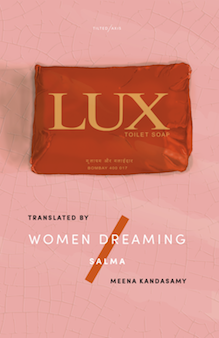
Story-crafting in English and Tamil: “English is my second language, so when I write in English I do labor twice as hard, but sometimes, the hard work involved itself adds to the artistic dimension. I am much more fussy and exacting because I want to choose the precise word in a second language, I pay far more attention to how it sounds off the page because the rhythms of my ears are still attuned to Tamil almost as a reflect. I personally think I’m more successful writing in English than if I were in Tamil because it allows me to be twice removed—once as a writer (standing outside, writing in), and secondly as someone very conscious that this is not her mother-tongue. There is a sense of strangeness that remains, and that perhaps makes all my English writing very much my own.”
On swearing: “I loved the women swearing. It is a very Tamil thing—women might appear very pious, religious but when you rub them the wrong way, you hear things come out of their mouths that will shock you. I kept feeling—will the English reader get this? So, there’d be a character who will implore Allah, and say, ‘Allah why don’t you punish this cunt-son?’ The extreme religiosity marries so easily with coarse profanity.”
Natascha Bruce: Chinese to English

Natascha Bruce studied Chinese at Cambridge but only started taking translation seriously when she entered a Chinese translation competition while working for an NGO in Jerusalem. Soon after, she moved with her partner to Hong Kong, where she met Chinese-language writers, read their works, and began her career as a translator of Chinese novels. She is currently working on Dorothy Tse’s first novel, Owlish and the Music-Box Ballerina, and her other translated works include Lake Like a Mirror by Ho Sok Fong and Lonely Face by Yeng Pway Ngo. Bruce, who now lives in Chile, says she has “a meaningful relationship with Chinese, Italian and Spanish, although these relationships are wildly different to one another.”
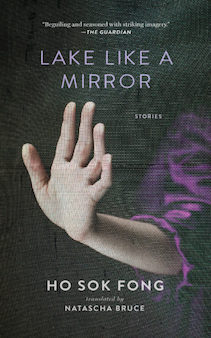
On the cultural specificities of translating Malaysian Chinese: “I’ve only been to Malaysia twice: once to Genting Highlands when I was doing research for my translation of Yeng Pway Ngon’s Lonely Face, and once to visit Sok Fong in Kampar while I was translating Lake Like a Mirror. Sok Fong introduced me to her cats, took me around her local pasar (market), showed me the coffee shops where she goes to write, read my palm, described the different places she had been while writing the stories, told me about books she liked. At the start of the project, I worried constantly about not having access to the specific cadences of Malaysian English, and about upsetting the careful balance of Sok Fong’s stories by not even knowing what I didn’t know about their context. As I came to know Sok Fong, though, and felt a deepening intimacy with her and her writing, I had a growing confidence that I could trust my responses to the words she had put on the page.”
On Hong Kong’s trilingual protest slangs: “In the past year I’ve been awed by the ingenuity of Hong Kong protest slang—the way protesters have shifted between Cantonese, Mandarin, and English to adapt to new restrictions, using the enforced trilingualism of Hong Kong to their advantage. They’re merging characters to create totally new ones, appropriating police insults, making extensive use of homophones both within and across languages, playing on the different pronunciations of characters in Cantonese and Mandarin, often all at once. The speed, the adaptability, the mixture of playfulness and defiance, the bravery: it’s phenomenal.”
Izidora Angel: Bulgarian to English

Chicago-based Izidora Angel’s next book is Nataliya Deleva’s debut Four Minutes. Her first effort was Hristo Karastoyanov’s The Same Night Awaits Us All. Her next fairy godmother-ing adventure (which includes playing agent, PR person, social media guru, grant writer, and branding expert) is Yordanka Beleva’s Keder (“some of the most beautiful, heartbreaking and almost magical writing to come out of Bulgaria in the last few years.”). Check out one of her stories published in the Los Angeles Review. Angel is the co-founder of The Third Coast Translators Collective.
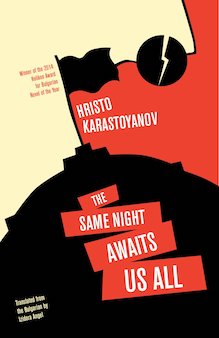
The “Inferential Mood” in Bulgarian: “This is what I love and loathe about translating the Bulgarian. It’s got these crazy 37 moods and tenses. Can you imagine studying this? So really the richness of the tongue is all in the grammar, in the way a verb is conjugated to relay so much potency. The inferential mood alleges something has happened while acknowledging that the teller of the event was not there to witness the event, so… did it actually happen? It’s the perfect gossip tense! Honestly, Bulgarian newspapers get away with murder by employing it. On the whole, though, the inferential mood demonstrates how analytical and uniquely structured the Bulgarian is and this tense is, naturally, impossible to render into English. In English, you can say ‘allegedly’ a couple of times but that’s too burdensome to employ for the duration of a novel, so you have to choose: did it or did it not happen—and run with it.”
On the fight against erasure: “I’ve found that the collective’s mission ebbs and flows with the times. We may have come together as language artists looking to create community, but lately, we’ve zeroed in on some pretty serious battles: the massive underrepresentation of women in translation, the erasure of the translator from the very work they have translated, the ghastly financial conditions we work under, the preservation and protection of endangered and Indigenous languages.
Next time you read a review of a novel in translation in a mainstream outlet, see how long it is before the translator is even named, and count how many words are used to review the actual translation. This is what I mean when I say it is a tooth and nail fight to combat our erasure. It is somehow presumed that a translator churns out a text word by word. Outlets like The New York Times are really leaving half the story on the table when they dedicate zero space and intellectual curiosity to who reverse-engineered the novel and put it back together and how. Of course, doing this would inevitably shake up their reviewer shortlist.”
Katrina Dodson: Portuguese to English

When Katrina Dodson returned from her first trip to Brazil in 2002, she began learning Portuguese by listening to cassettes on her Walkman. Her experience of Brazil, especially of its music, was so expansive that she wanted to share the country’s many faces by becoming a translator. Dodson is the translator of Clarice Lispector’s The Complete Stories, she also speaks (and studied) her mother’s ancestral tongue, Vietnamese, and teaches translation at Columbia University.

Katrina Dodson in Vietnamese vs. Katrina Dodson in Brazilian Portuguese: “It’s a source of anguish and something of a mystery to me that my life trajectory has led to a point where I can sometimes pass as Brazilian—with no family relationship to the country—whereas I speak Vietnamese like a child. My Brazilian persona is brighter and more open than my American self, with bigger hand gestures, probably in part because I love speaking Portuguese, so it automatically puts me in a better mood. Plus, there’s this element of escaping the same old self I grew up with, so it makes things lighter; the language is less saturated by time.
In Vietnamese, I feel so small and tentative, always worried that someone won’t understand the words I’m struggling to pronounce or will start laughing at me (like my relatives), or even worse, start talking so fast that I can’t understand. I grew up hearing Vietnamese and actually studied it in college and spent a semester living with a family in Hanoi, but the language is so different from English, with six tones, so I lose it quickly when I don’t practice.
It’s funny, being a heritage speaker should in some ways embolden you to reclaim your roots, but for me, every time I make a mistake in Vietnamese, it reminds me that I’m only half, and that I didn’t grow up speaking it with both parents at home. When I say something wrong in Portuguese, it’s just a momentary lapse in my performance without any heavier consequences for my sense of identity. Reading Vietnamese American writers like Vi Khi Nao and Ocean Vuong brings up a lot of memories and sensory associations for me, and their bold imaginations inspire me to reshape my relationship to Vietnamese.”
Translating a Brazilian classic: “Macunaíma is about as far from The Complete Stories by Clarice Lispector as you can get, in many ways, so I am very curious to see who will get excited about Mário de Andrade’s 1928 modernist classic. Lispector is a master of conjuring emotional landscapes and complex psychological states, and readers can dive into her writing without any awareness of Brazilian culture or history. Andrade’s experimental novel, on the other hand, is something of a Brazilian national epic that weaves together a patchwork portrait of Brazil based on an encyclopedic array of sources, including Indigenous myths, rural folktales, Afro-Brazilian syncretic religious practices, and Iberian troubadour ballads. As with epic and folklore, there’s no interiority—it’s all episodic action, and the complexity lies in the novel’s inventive language, as well as in Andrade’s recasting of collective storytelling in this roving narrative about the trickster hero Macunaíma.
Translating Macunaíma has led me to completely reinvent my approach to translation, especially in considering what is untranslatable, in part because the book mixes various regional forms of spoken Brazilian—as opposed to written Portuguese—with dizzying lists of flora and fauna in Tupi, the major Indigenous language, as well as words from other Indigenous languages and Bantu languages. There’s a common misconception that translating means making everything comprehensible, but the best works of literature often produce deliberate ambiguity and sometimes outright illegibility. So in determining which non-Portuguese words to leave in the original, I think about the music of these list poems that conjure the abundance of the Amazon rainforest, the ethos of using local, non-European naming conventions for the natural world in the Americas, as well as which non-Portuguese phrases function as incantations or bridges back to certain histories that would lose their power if I substituted them with words in English.”
Aoko Matsuda: English to Japanese
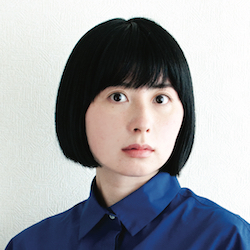
While all the translators on this list deliver books from the world’s many languages into English, Aoko Matsuda translates English books into Japanese. She has translated works by contemporary American writers such as Karen Russell and Carmen Maria Machado. In addition to her translation work, Matsuda is also a fiction writer. Her latest short story collection, Where the Wild Ladies Are, translated by Polly Barton, is a feminist reimagining of classic Japanese ghost stories.
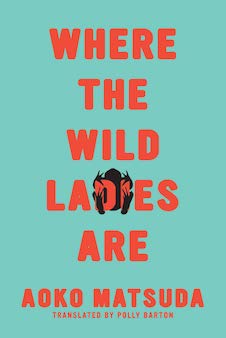
Reading the English translation of her book: “One thing I learned by being translated is that the act of translating is not a one-way process. It’s always an interaction, and even when we don’t actually communicate during their process of translating, I can see that interaction from their texts afterwards, and see how they understand me and my stories. The feeling when I read them is electrifying.”
The popularity of American literature in Japan: “It is not easy to come up with a name of a contemporary American writer who is as famous in Japan as Murakami is in the U.S., but the publishers and translators in Japan have always been passionate about introducing the works of American writers, as well as the works of the contemporary writers of other countries. There are a certain number of Japanese book lovers who are especially fond of foreign literature, and they always look forward to reading the books of newly introduced writers. One thing I love about Japanese readers is that they empathize and love the strange and compelling stories written by the contemporary American female writers, like Miranda July, Kelly Link, and all of the writers I’ve translated.”
The post 7 (More) Literary Translators You Should Know appeared first on Electric Literature.









